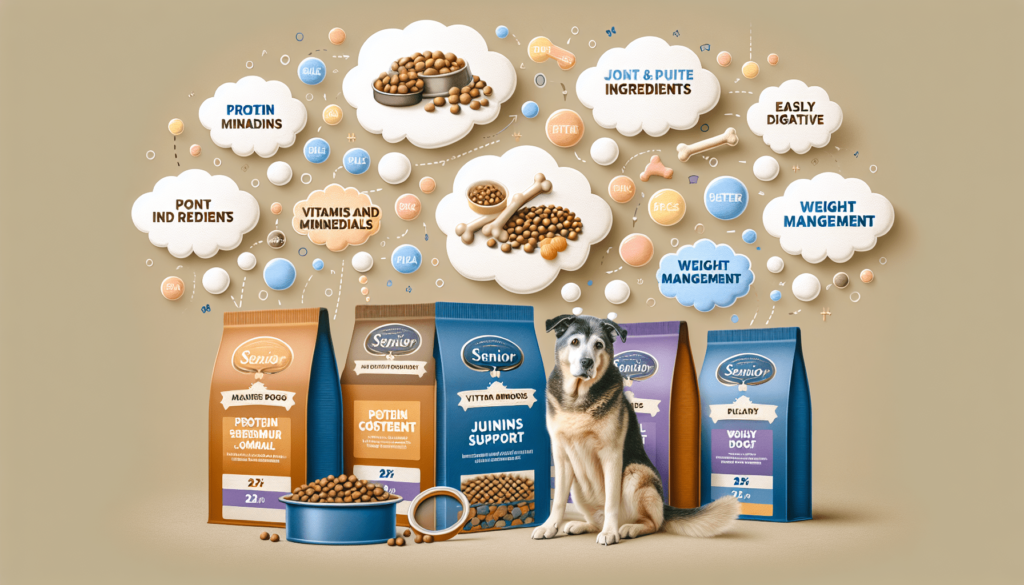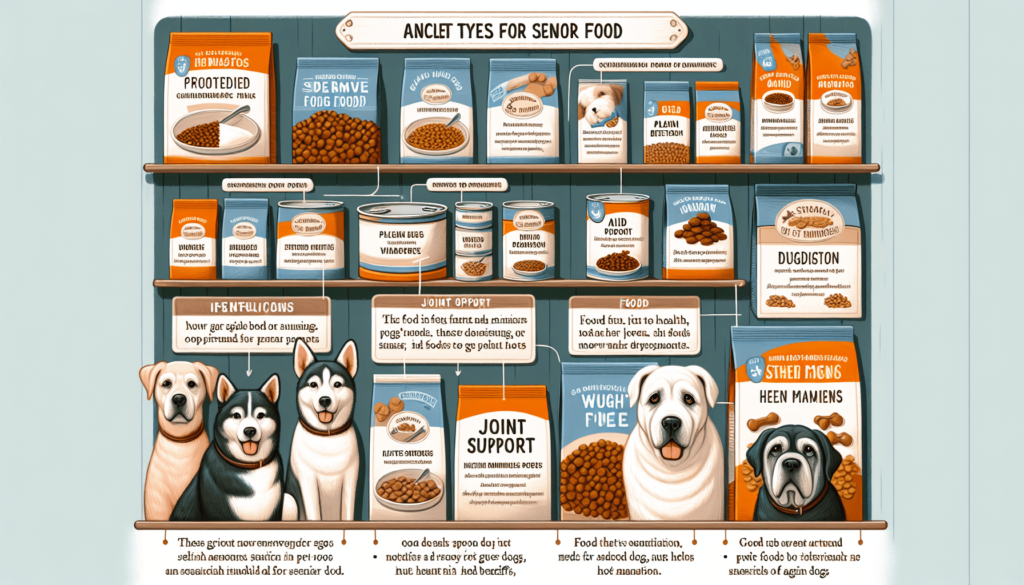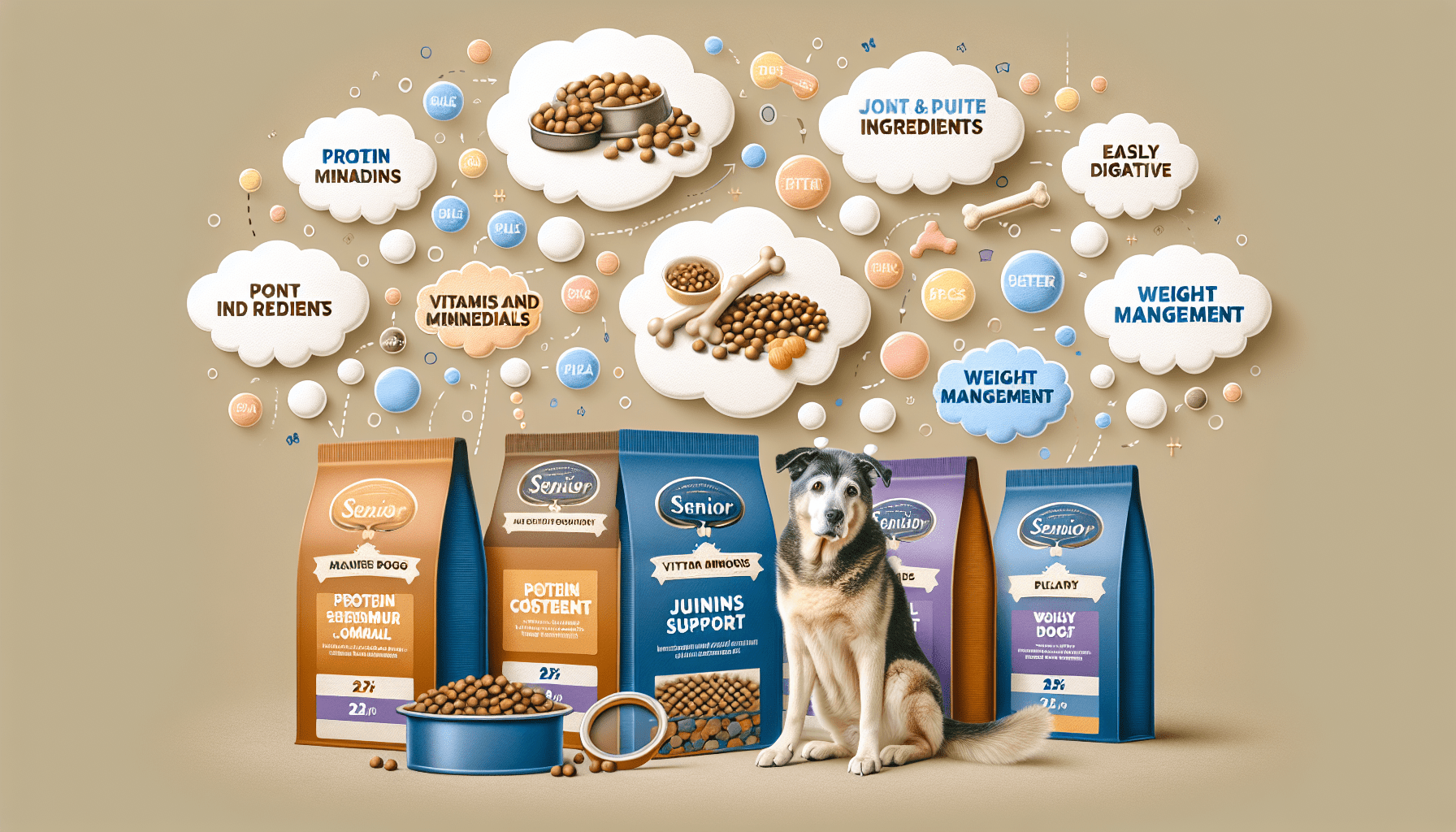As your beloved furry companion continues to age, their nutritional needs change as well. It becomes crucial to select the right food that meets their specific requirements and ensures their overall well-being. In this article, we will explore the importance of choosing the right food for your aging dog, highlighting key factors to consider, such as protein content, calorie intake, and any special dietary needs they may have. By making informed decisions about your dog’s diet, you can help them live a healthier and happier life in their golden years.
Assessing Your Aging Dog’s Nutritional Needs
Understanding the Aging Process
As your dog gets older, their nutritional needs will change. It’s important to understand the aging process and how it affects their body. Dogs go through various physical and cognitive changes as they age, including a slower metabolism, decreased muscle mass, reduced digestive function, and an increased risk of certain health conditions. These changes can impact their appetite, digestion, and overall well-being. By understanding the aging process, you can better assess your dog’s nutritional needs and make appropriate adjustments to their diet.
Consulting with Your Veterinarian
When it comes to assessing your aging dog’s nutritional needs, consulting with your veterinarian is crucial. Your vet will have a comprehensive understanding of your dog’s health history and can provide personalized recommendations based on their specific needs. They will be able to assess your dog’s body condition, discuss any existing health concerns or conditions, and make recommendations for appropriate dietary changes. Your vet can also discuss any necessary modifications to your dog’s diet to address specific health concerns or age-related issues.
Identifying Specific Health Concerns
As your dog ages, they may develop certain health concerns that can impact their nutritional needs. These concerns can range from joint issues, such as arthritis, to dental problems, kidney disease, or food allergies. By identifying and addressing these specific health concerns, you can ensure your dog’s diet is tailored to their individual needs. This may involve choosing a specialized diet or adding supplements to their food to support their overall health. Identifying and addressing these concerns will help your aging dog age comfortably and maintain their quality of life.
Considering Breed and Size
Different dog breeds and sizes have different nutritional requirements. Larger breeds, for example, may have different needs when it comes to protein and calorie levels compared to smaller breeds. It’s important to consider your dog’s breed and size when choosing their food. Certain breeds may be more prone to certain health conditions or have specific dietary needs. By considering your dog’s breed and size, you can select a food that is tailored to their unique requirements and will support their overall health and well-being.
Understanding Dog Food Labels
Reading Ingredient List
When choosing a dog food for your aging pet, it’s important to read and understand the ingredient list. The ingredient list will provide insight into the quality and source of the ingredients used in the food. Look for whole food ingredients, such as real meat, fruits, and vegetables. Avoid dog foods that contain fillers, by-products, or artificial additives. The ingredient list should also be clear and easy to understand. If you’re unsure about any ingredients, don’t hesitate to ask your veterinarian for clarification.
Analyzing Guaranteed Analysis
The guaranteed analysis on a dog food label provides information about the nutrient content of the food. It typically includes the minimum percentages of protein and fat, as well as the maximum percentages of fiber and moisture. This information can help you determine whether the food meets your dog’s specific nutritional needs. It’s important to compare the guaranteed analysis of different dog foods to ensure you’re selecting a food that is appropriate for your dog’s life stage and health requirements.
Evaluating AAFCO Statements
The Association of American Feed Control Officials (AAFCO) creates guidelines for pet food manufacturers. Dog foods that meet AAFCO standards will have a statement on the label, indicating that the food is complete and balanced for a particular life stage, such as adult maintenance or growth and reproduction. It’s important to look for this statement on the label to ensure that the food provides all the necessary nutrients your aging dog needs. If a dog food does not have an AAFCO statement, it may not meet the recommended standards for a balanced diet.
Avoiding Controversial Ingredients
There are certain ingredients that can be controversial or potentially harmful to dogs, especially those with specific health conditions or sensitivities. These ingredients include artificial preservatives, colors, and flavors, as well as common allergens like wheat, corn, and soy. Avoiding these controversial ingredients can help reduce the risk of adverse reactions or digestive issues in your aging dog. Opt for dog foods that are made with high-quality, natural ingredients and are free from potential allergens or harmful additives.

Key Nutrients for Aging Dogs
Protein
Protein is an essential nutrient for dogs of all ages, but it becomes even more important as they age. Protein supports muscle health and helps maintain a healthy weight. Look for a dog food that contains a high-quality source of animal protein, such as chicken, fish, or lamb. Adequate protein intake can help your aging dog maintain their muscle mass, energy levels, and overall well-being.
Fats and Fatty Acids
Healthy fats and fatty acids are important for your aging dog’s overall health, including their skin, coat, and immune system. Look for a dog food that contains sources of omega-3 and omega-6 fatty acids, such as fish oil or flaxseed. These fatty acids have anti-inflammatory properties and can support joint health and cognitive function in aging dogs.
Digestible Carbohydrates
While carbohydrates are not essential for dogs, they can provide a source of energy and fiber. Look for a dog food that contains easily digestible carbohydrates, such as sweet potatoes or brown rice. Avoid dog foods that are high in fillers or grains that may be difficult for your aging dog to digest. Digestible carbohydrates can provide your dog with the energy they need while minimizing digestive issues.
Vitamins and Minerals
Vitamins and minerals are important for your aging dog’s overall health and well-being. Look for a dog food that contains a variety of vitamins and minerals, including vitamin E, vitamin C, and minerals like zinc and selenium. These nutrients can support immune function, promote healthy aging, and help prevent age-related diseases.
Antioxidants
Antioxidants play a crucial role in supporting your aging dog’s health by reducing oxidative stress and inflammation. Look for a dog food that contains antioxidant-rich ingredients, such as blueberries, spinach, or cranberries. These antioxidants can support your dog’s immune system, brain function, and overall vitality as they age.
Fluid and Fiber
Adequate fluid and fiber intake is important for your aging dog’s digestive health. Look for a dog food that contains natural sources of fiber, such as fruits, vegetables, and whole grains. Proper hydration is also essential, so consider wet or canned dog food options that provide additional moisture. A healthy balance of fluid and fiber can help prevent constipation and support a healthy digestive system in your aging dog.
Types of Dog Food for Aging Dogs
Senior Dog Food
Senior dog food is specifically formulated to meet the nutritional needs of aging dogs. It typically contains lower calorie and fat levels to prevent weight gain, as well as added joint support ingredients to promote mobility. Senior dog food may also contain additional antioxidants and nutrients to support brain function and overall health in older dogs.
Weight Management Food
If your aging dog is overweight or prone to weight gain, weight management food may be a good option. These foods are lower in calories and fat to help your dog maintain a healthy weight. They often contain added fiber to promote satiety and prevent overeating. Weight management food can help your aging dog achieve and maintain a healthy body condition.
Limited Ingredient Food
If your aging dog has specific food sensitivities or allergies, a limited ingredient diet may be beneficial. These foods are made with a limited number of high-quality ingredients to minimize the risk of adverse reactions. Limited ingredient food can help alleviate digestive issues and support a healthy immune system in your aging dog.
Special Prescription Diets
In some cases, your veterinarian may recommend a special prescription diet for your aging dog. These diets are formulated to address specific health concerns, such as kidney disease, heart disease, or diabetes. Special prescription diets are tailored to meet your dog’s unique nutritional needs and can help manage and improve their overall health.

Considering Texture and Consistency
Dry Kibble
Dry kibble is the most common type of dog food and is widely available. It is convenient to store and feed, and it helps to clean your dog’s teeth as they chew. However, dry kibble may be harder for aging dogs with dental issues to eat, and some dogs may not find it as palatable. If your aging dog has dental issues or has difficulty chewing, moistening the kibble with water or choosing a different type of food may be more suitable.
Canned Food
Canned food, also known as wet food, is moist and has a higher water content compared to dry kibble. It can be easier for aging dogs with dental problems to eat, and it is generally more palatable. Canned food may also be a good option for aging dogs who need additional moisture in their diet. However, it can be more expensive and has a shorter shelf life once opened.
Semi-Moist Food
Semi-moist food is a middle ground between dry kibble and canned food. It has a soft and chewy texture that many dogs find appealing. It typically contains more artificial additives and preservatives compared to other types of dog food. While it can be convenient and palatable, semi-moist food is generally not recommended for long-term feeding due to its high sugar and salt content.
Addressing Dental Health
Soft Dental Chews
Soft dental chews are a great option for maintaining your aging dog’s dental health. These chews are specifically designed to help control plaque and tartar buildup while being gentle on your dog’s teeth and gums. Look for dental chews that are specifically formulated for senior dogs and contain ingredients like enzymes or antiseptics that promote oral health.
Brushing Your Dog’s Teeth
Regularly brushing your aging dog’s teeth is essential for their dental health. Use a toothbrush and toothpaste specifically made for dogs, as human toothpaste can be harmful to them. Start by introducing tooth brushing gradually to make it a positive experience for your dog. Aim to brush their teeth at least a few times a week to prevent dental issues and maintain good oral hygiene.
Dental Diets
Some dog foods are specifically formulated to promote dental health. These diets usually have a larger kibble size or a special texture that helps to mechanically clean your dog’s teeth as they chew. Dental diets can be a convenient way to support your aging dog’s dental health while ensuring they receive the proper nutrition they need.
Managing Weight and Mobility
Calorie Control
Managing your aging dog’s weight is important for their overall health and mobility. Excess weight can put unnecessary strain on their joints and increase the risk of health conditions like arthritis. Choose a dog food that is specifically formulated for weight management or consult with your veterinarian to determine the appropriate calorie intake for your dog’s age, breed, and activity level. Monitoring their food intake and adjusting portion sizes can help ensure they maintain a healthy weight.
Joint and Mobility Supplements
As dogs age, they may experience joint stiffness or arthritis, which can impact their mobility and quality of life. Joint and mobility supplements can help support your aging dog’s joint health and reduce inflammation. These supplements typically contain ingredients like glucosamine, chondroitin, and omega-3 fatty acids. Consult with your veterinarian to determine if joint supplements are necessary and which ones would be most beneficial for your dog.
Prescription Diets for Weight Management
If your aging dog is overweight or obese, your veterinarian may recommend a prescription diet specifically formulated for weight management. These diets typically have controlled calorie and fat levels to promote weight loss. They may also contain added ingredients to support joint health and overall well-being. Prescription diets for weight management should be used under the guidance of your veterinarian to ensure they are safe and effective for your aging dog.
Transitioning to a New Food
Gradual Transition
When switching your aging dog to a new food, it’s important to do so gradually. Abruptly changing their diet can cause digestive upset, including diarrhea or vomiting. Start by mixing a small amount of the new food with their current food and gradually increase the ratio over several days or weeks. This slow transition allows your dog’s digestive system to adjust to the new food more easily and reduces the risk of gastrointestinal discomfort.
Monitoring Digestive Changes
During the transition to a new food, it’s important to closely monitor your aging dog’s digestive changes. Keep an eye out for any signs of digestive upset, such as diarrhea, vomiting, or a decrease in appetite. If these issues persist or worsen, consult with your veterinarian to determine if the new food is suitable for your dog or if other adjustments need to be made.
Seeking Veterinary Advice If Needed
If you’re unsure about the best food choice for your aging dog or encounter any difficulties during the transition process, it’s important to seek veterinary advice. Your veterinarian can provide guidance based on your dog’s specific needs, health concerns, and dietary requirements. They can recommend alternative food options or provide further guidance to ensure your aging dog’s nutritional needs are met without causing any adverse effects.
Common Allergies and Food Sensitivities
Recognizing Common Allergens
Some dogs may develop allergies or food sensitivities as they age, which can cause gastrointestinal or skin issues. Common allergens for dogs include ingredients like wheat, corn, soy, poultry, or beef. If you suspect your aging dog has a food allergy or sensitivity, consult with your veterinarian to determine the specific allergens and make appropriate dietary changes.
Elimination Diets
If your aging dog has a suspected food allergy or sensitivity, an elimination diet may be necessary to identify the culprit ingredient. This involves feeding your dog a diet consisting of a single protein and carbohydrate source that they have not been previously exposed to. Slowly add other ingredients back into their diet one at a time while monitoring for any adverse reactions. The elimination diet process can help identify the specific allergens and guide you in selecting a suitable dog food for your aging dog.
Hypoallergenic Foods
Hypoallergenic dog foods are specifically formulated to minimize the risk of triggering allergic reactions. These foods typically contain a limited number of high-quality ingredients that are less likely to cause allergies or sensitivities. Hypoallergenic foods can be beneficial for aging dogs with known food allergies or sensitivities, ensuring they receive the necessary nutrients without experiencing any adverse effects.
Feeding Schedule and Portion Control
Establishing a Consistent Feeding Schedule
Establishing a consistent feeding schedule is important for maintaining your aging dog’s digestive health and overall well-being. Feed your dog at the same time each day and avoid leaving food out for long periods. Dividing their daily food portion into two or three smaller meals throughout the day can help prevent overeating and improve digestion. A consistent feeding schedule also allows you to monitor their eating habits and detect any changes in appetite or overall health.
Determining Portion Sizes
Determining the correct portion size for your aging dog is essential for maintaining a healthy weight. Portion sizes can vary depending on factors such as age, breed, activity level, and overall health. Use the feeding guidelines provided on the dog food packaging as a starting point, but remember that these are general recommendations. Consult with your veterinarian to determine the appropriate portion size for your specific dog and make adjustments as needed.
Adjusting as Your Dog Ages
As your aging dog progresses through their senior years, their nutritional needs may change. They may require fewer calories due to a slower metabolism and decreased activity level. Monitor their body condition and energy levels and adjust their portion sizes accordingly. Regularly consult with your veterinarian to ensure you’re meeting your aging dog’s changing nutritional needs and adjusting their diet as necessary.
Choosing the right food for your aging dog is essential for their overall health and well-being. By understanding their nutritional needs, consulting with your veterinarian, and considering factors such as specific health concerns and breed, you can make informed decisions when it comes to their diet. Reading and understanding dog food labels, selecting appropriate types of food, addressing dental health and weight management, and transitioning to new foods all play important roles in providing your aging dog with the nutrition they need to age gracefully and comfortably. Regularly reassess your dog’s nutritional needs as they age and consult with your veterinarian for personalized recommendations to ensure they continue to thrive in their senior years.

